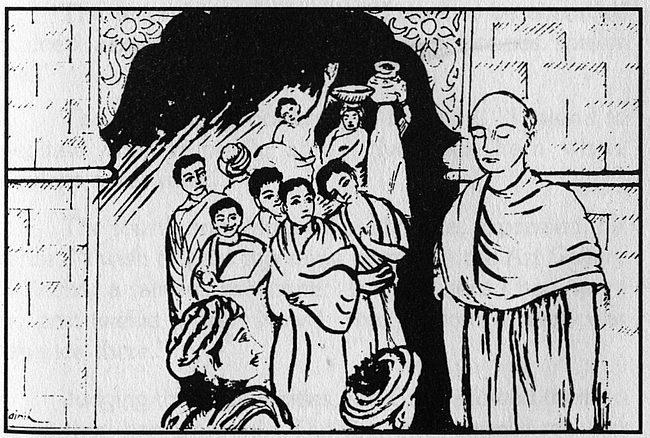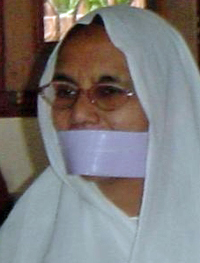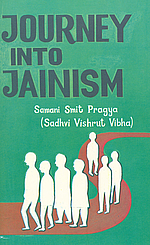Dridhaprahaari was born in a wealthy Brahman family. Although his father was an honest and religious person, Dridhaprahaari was addicted to all the seven vices, including drinking, meat-eating, stealing and gambling. His father, a worthy man, tried unsuccessfully to persuade his son to give up his immoral habits, but Dridhaprahaari made no attempt to correct his deplorable behavior. His father, finally overcome with antipathy, threw his disgraceful son out of the house. In doing so, though, he incurred the wrath of his son, who then set off and joined a thieves' gang. He became a practised highway robber, plundering and killing many innocent people.
Generally impressed by his malignancy and ruffianism, the leader of this gang was extremely pleased with Dridhaprahaari, and thought him very dexterous. In view of his unbending courage and his matchless and unfailing style of inflicting a blow, the aged chief dubbed him "Dridhaprahaari" (one who hits hard), and regarded him as his own son. Soon Dridhaprahaari was held in high esteem by the whole gang, and finally he became the chief of the gang. All the thieves now worked under his instructions.
Accompanied by his comrades-in-arms, he looted a great town and collected enormous amount of booty, killing many people. After a while, Dridhaprahaari took rest in the home of a Brahman. There was the Brahman, his wife and their children in the house. His children were anxious to eat the kheer their mother was preparing.
Dridhaprahaari was also invited to have lunch there. As the smell of food reached his nostrils, however, he could not control himself and came to the kitchen uncalled by the lady of the house. As he sat down beside the pot of kheer, the Brahman's wife became upset. Scolding him she said, "O fool! You should know the fact that after your touching this sweet preparation,, it will be of no avail to us. Therefore, please sit at some distance. I shall offer you food later on. You should observe the traditions of this household, because the house of a Brahmin does not allow its food to be touched by anybody else until offered."
Dridhaprahaari was extremely angered by the rebuke. He could not control his emotions and cut the Brahman's wife with his sword into two pieces on the spot. Hearing the horrible screams, the Brahman, who was in the bathroom, rushed to the scene to help. Dridhaprahaari killed him too. A cow who was nearby witnessed the gruesome murder in the family and came running to take revenge. As Dridhaprahaari's blow was always unfailing, he gave such a blow with his sword that the cow's stomach was cut in two pieces. The cow had been at the advanced stage of pregnancy. The embryo, writhing in pain, came out. It was a very pitiable and heart-rending sight. On one side there were Brahman and his wife, on the other side there were the cow and the calf coming out prematurely from the womb. Violence was at its apex. If the heart of a person does not melt at such a scene, really it is not heart, it is stone.
Dridhaprahaari, standing in the midst of such pathos, could not help but be affected by it. He was, after all, a human being and possessed some sensitivity. Compassion was now awakened in his heart. This flow of compassion was so immense that he felt pity and regret for what he had done. Now was a time of significant reflection and introspection for Dridhaprahaari.
The recalled all the disgusting incidents in his past and present life. He was replete with self -- condemnation. The dormant feeling of humanity agitated his soul, and he thought, "I am a human being. I feel pleasure and pain. Does it behove of me as a human being to snatch others' lives, steal money and torture them? Even an animal like a cow can sacrifice its life to relieve the sufferings of its master. Furthermore, it has some discretion. My heart is never moved by such horrible deeds. What can possibly be more cruel and inhuman than this? Dridhaprahaari, thoroughly repulsed with himself and seeking to purify his soul, discarded his sword and clothes and left the house in changed robes.
Thus did the tyrant thief now adopt monkhood, uproot his hair and give up his household life. He thought to himself, "I will go to the wild forests, perform penance, sit in meditational posture and pass on into deep ecstasy. I shall restrain the bodily movements. I have hurt the feelings of thousands of people. I have killed a number of infants. I have made many young ladies widows. I have troubled thousands of people by purloining property worth millions of rupees. They must all desire retaliation against me. I must do Kaayotsarg out of the town. There I will have to bear more sufferings, which shall be conducive to the shedding off of the karmas."
Dridhaprahaari stood in the posture of relaxation on the eastern gate of the town. Hundreds of men, women and children passed by that way. As he did, many became upset and enraged, saying, "You have killed my father," or "You have killed my uncle and wife." Some threw sand at his eyes and still others pelted stones at him. Muni Dridhaprahaari remained very calm, and remained deeply engrossed in kaayotsarg for one and a half month. He forgave all. Gradually, people became less hostile, as they realized that Dridhaprahaari was sorry for what he had done and was sincerely trying to make amends.

Hundreds of men, women and children passed by that way. As he did, many became upset and enraged, saying, "you have killed my father", or "You have killed my uncle and wife."
Dridhaprahaari departed from that place and started kaayotsarg at the next gate of the town. There also did the people scold him, but he pocketed all the insults. He bore all tortures with complete forgiveness and accomplished kaayotsarg. As he was adept in theft, in the same way he was resolute and steadfast in religion. He put into practice Lord Mahavira's saying, "The brave in physical action are also brave in religious affairs." After severe penance for six months, he obtained kevalgyaana.
 Sadhvi Vishrut Vibha
Sadhvi Vishrut Vibha
